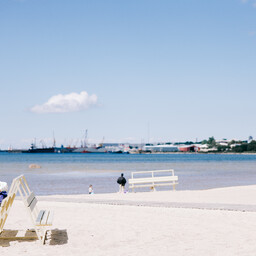Tänavune
rannahooaeg
on külmem kui eelmistel aastatel. Kuid see eestlaseid ei sega. Lauren ütleb: "Eile oli esimene rannapäev. Täna on teine. Vette ma ei lähe, sest
punane lipp
on väljas ja
vees ei tohi olla
."
rannahooaeg
Tõlge fraasile: rannahooaeg
EN
beach season
punane lipp
Tõlge fraasile: punane lipp
EN
red flag
vees ei tohi olla
Tõlge fraasile: vees ei tohi olla
EN
you must not be in the water
Punane lipp ei takista karastunumaid. Üks vilunud supelsaks ei läinud merre, vaid tuli läbi mere Kopli poolt. Portfelliga.
Pühapäevast on ametlikes randades tööl ka
vetelpäästjad
. Päästmist rannas tihti ette ei tule. Vetelpäästja Andreas Saulep ütleb: "Punane lipp tähendab, et
vees on ohtlik ujuda
, kuna vesi on külm - 7 kraadi. Me ei keela, aga ujuda saab omal vastutusel."
vetelpäästjad
Tõlge fraasile: vetelpäästjad
EN
lifeguards
vees on ohtlik ujuda
Tõlge fraasile: vees on ohtlik ujuda
EN
it is dangerous to swim in the water
Vetelpäästja Kairit Kalda lisab: "Päästmist tuleb ette harva. Teeme head
ennetamistööd
. Äkki ühe korra, kui läheb halvasti."
ennetamistööd
Tõlge fraasile: ennetamistööd
EN
preventive work
Lilla lipp tähendab, et
vesi on reostunud
ja siis vetelpääste vette inimesi ei luba. Praegu on Stroomi rannas parim supluse aeg. Vesi on külm, puuduvad sinivetikad ja pole vihma olnud - vesi on puhas.
vesi on reostunud
Tõlge fraasile: vesi on reostunud
EN
the water is polluted
Terviseameti kommunikatsiooniosakonna juhataja Imre Kaas ütleb: "Stroomi rannaga on Tallinnas selline olukord, et tugevad vihmasajud viivad haigustekitajad kanalisatsiooni ja lõpuks merre. See on näha
veeproovid
es. Veekvaliteet ei ole stabiilne."
veeproovid
Tõlge fraasile: veeproovid
EN
water samples
Mais võttis terviseamet kõigist Eesti ujumiskohtadest veeproovi. Kõik vastab nõuetele. Hooldatud rand on hea keskkond ka neile, kes ei kipu vette.
Randa lugema tulnud Johann naudib lihtsalt ilma. Ta ütleb: "Loen raamatut 'Man's Search For Meaning'. Tulen
loodusesse
, sest ma olen vaene, elan Mustamäel ja seal on ainult hall igal pool ümberringi."
loodusesse
Tõlge fraasile: loodusesse
EN
into nature
This year's beach season is colder than in previous years. However, this does not bother Estonians. Lauren says: "Yesterday was the first beach day. Today is the second. I won't go into the water because the red flag is up, and you shouldn't be in the water."
The red flag does not deter the seasoned. One experienced swimmer did not go into the sea but came through the sea from Kopli. With a briefcase.
From Sunday, lifeguards are also on duty at official beaches. Rescues on the beach are not frequent. Lifeguard Andreas Saulep says: "The red flag means it is dangerous to swim in the water because the water is cold - 7 degrees. We do not forbid it, but you can swim at your own risk."
Lifeguard Kairit Kalda adds: "Rescues are rare. We do good preventive work. Maybe once, when things go wrong."
The purple flag means the water is polluted, and then lifeguards do not allow people into the water. Currently, it is the best time for swimming at Stroomi Beach. The water is cold, there are no blue-green algae, and there has been no rain - the water is clean.
Imre Kaas, head of the Health Board's communication department, says: "With Stroomi Beach in Tallinn, the situation is such that heavy rains carry pathogens into the sewer system and eventually into the sea. This is visible in water samples. Water quality is not stable."
In May, the Health Board took water samples from all swimming spots in Estonia. Everything meets the requirements. A well-maintained beach is also a good environment for those who do not venture into the water.
Johann, who came to the beach to read, simply enjoys the weather. He says: "I am reading the book 'Man's Search For Meaning'. I come to nature because I am poor, I live in Mustamäe, and there is only gray everywhere around."

